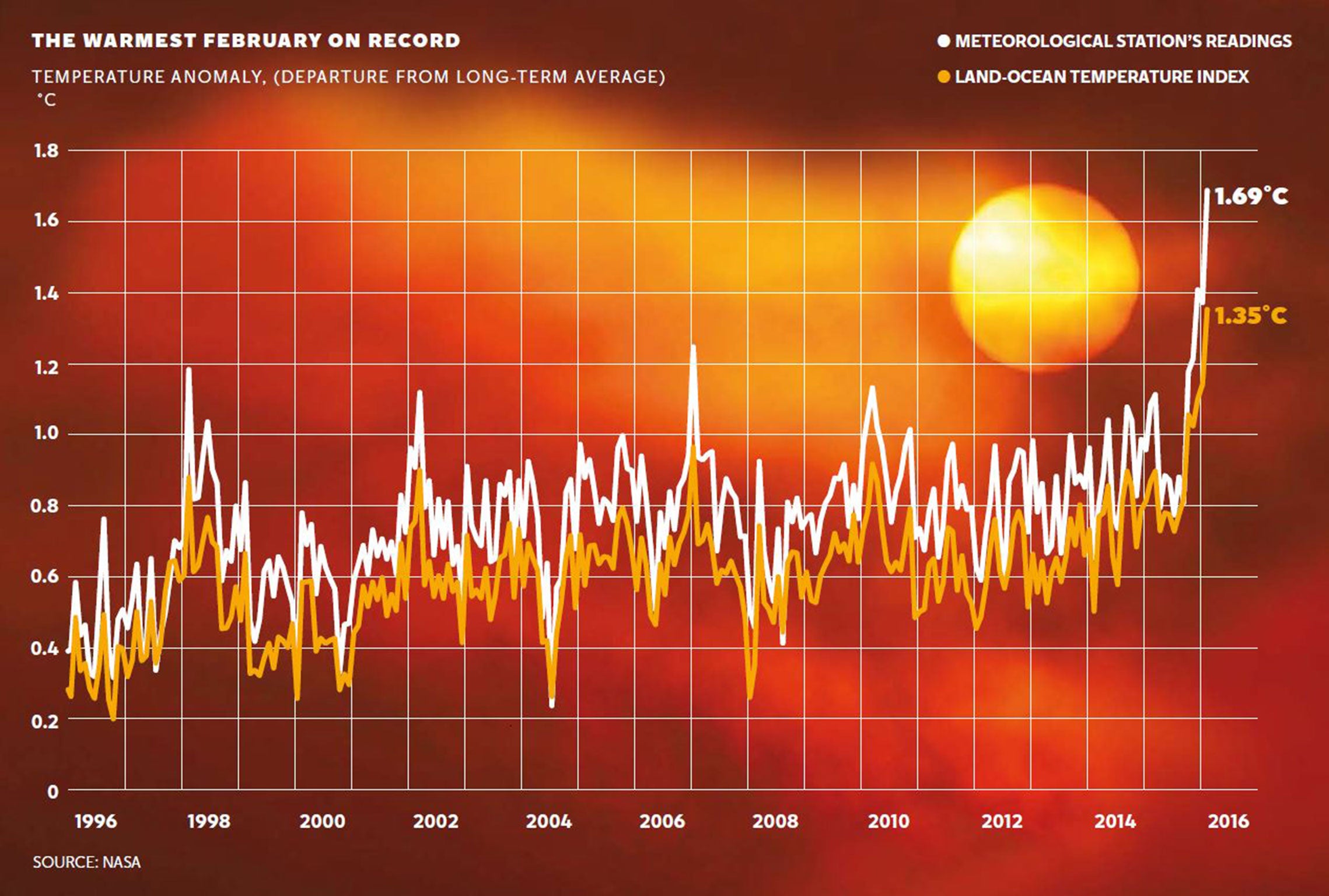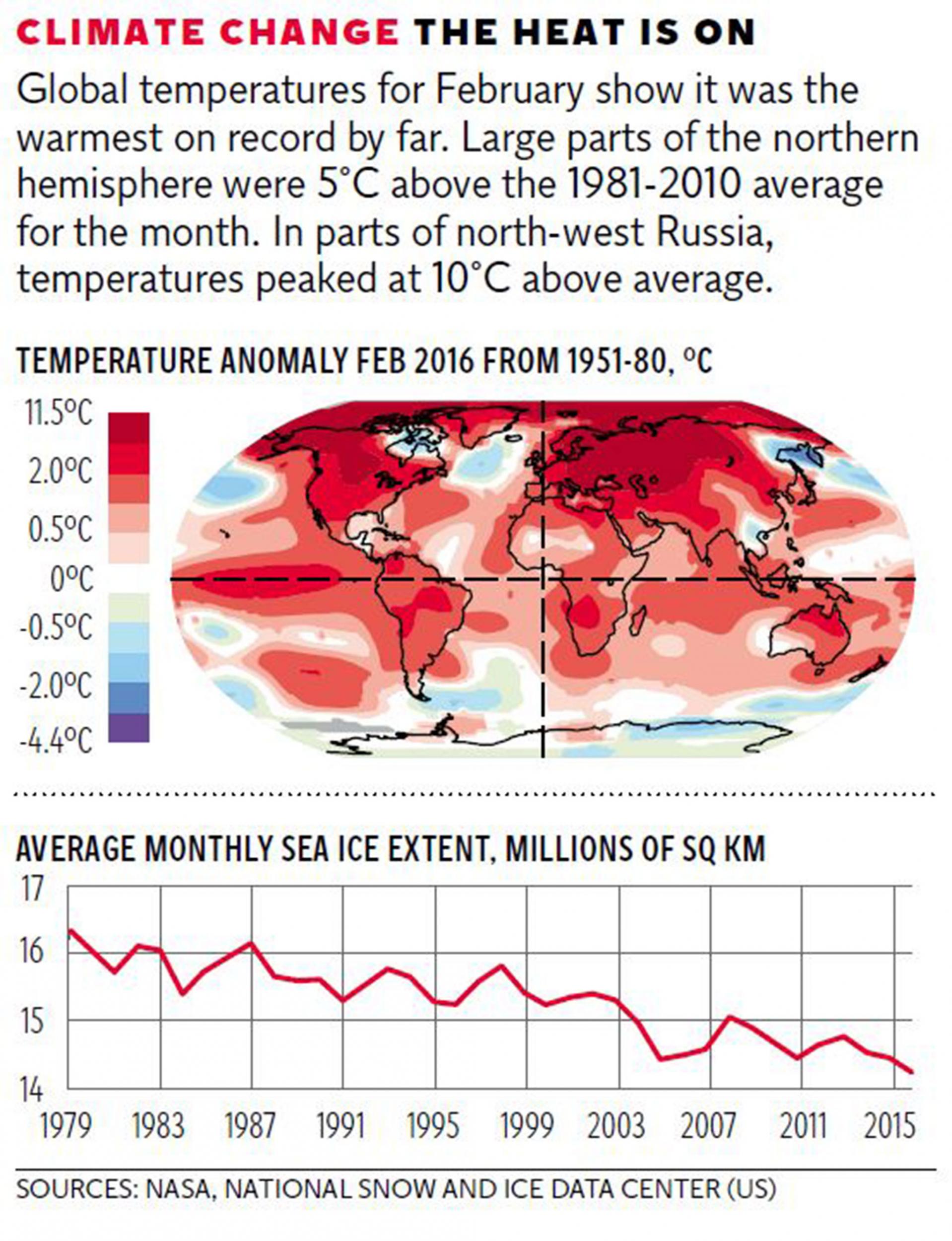Climate change: February was hottest month on record as 'exceptional' Nasa figures show global warming surge
Scientists repeat warnings global climate system is being strongly influenced by greenhouse gas emissions

Your support helps us to tell the story
From reproductive rights to climate change to Big Tech, The Independent is on the ground when the story is developing. Whether it's investigating the financials of Elon Musk's pro-Trump PAC or producing our latest documentary, 'The A Word', which shines a light on the American women fighting for reproductive rights, we know how important it is to parse out the facts from the messaging.
At such a critical moment in US history, we need reporters on the ground. Your donation allows us to keep sending journalists to speak to both sides of the story.
The Independent is trusted by Americans across the entire political spectrum. And unlike many other quality news outlets, we choose not to lock Americans out of our reporting and analysis with paywalls. We believe quality journalism should be available to everyone, paid for by those who can afford it.
Your support makes all the difference.A dramatic surge in the Earth’s surface temperatures took place in February which saw the biggest month-on-month rise in global warming on record, latest figures released by Nasa show.
As global temperatures rise well above their seasonal averages, especially in the northern hemisphere, the sea ice in the Arctic continues its overall downward trajectory with a new record monthly low for a February.
While some of the temperature rise has been put down to the large El Nino event currently coming to an end in the Pacific Ocean, scientists repeated their warnings that the global climate system is now being strongly influenced by human emissions of greenhouse gases, especially by the rising concentrations of carbon dioxide from fossil fuels.
February was the warmest month on record, and 2016 is heading to become the warmest year on record, warmer even than 2015 which had itself set a clear record over previous warmest years, according to the global surface temperature measurements compiled and released by Nasa.
Nasa confirmed that February 2016 was not only the warmest month ever measured globally, at 1.35C above the long-term average, but that it was more than 0.2C warmer than January 2016, which itself had held the previous monthly temperature record.
Gavin Schmidt, the director of Nasa’s Goddard Institute for Space Studies in New York, said on Twitter than he does not normally comment on individual months because there is “too much weather, not enough climate” but last month was “special”. He summarised his reaction to the data simply with: “Wow”.
Temperatures in the northern hemisphere especially saw temperature rise well above the global average, with the Arctic and northern Russia seeing exceptionally warm surface readings over land and sea.
The US National Snow and Ice Data Centre reported that the sea ice in the Arctic in February had once again failed to reform completely, leaving large patches of open ocean which in previous years had been topped with ice.
The extent of the sea ice in February was the lowest in the satellite record going back to the 1970s, for the second month in a row. This suggests a new record for winter sea ice will be reached in March – underling how higher temperatures are affecting both Arctic winters as well as summers.

Click HERE for larger annotated version of the graphic
European researchers, under the Copernicus Climate Service, using a slightly different method of analysing the surface temperature data than Nasa, also found that February 2016 was by far the warmest month on record.
It found for instance that February was more than 5C above the 1981-2010 average for the month over a region stretching from Finland to Greece and extending eastwards to western Siberia, Kazakhstan and the northern part of the Middle East. In parts of north-west Russia and the Barents Sea, temperatures peaked at more than 10C above average.

“February 2016 was the most exceptional month yet in a spell of exceptional months. Globally, the average temperature for the month was: 0.86C above the February average for 1981-2010; almost 0.5C higher than the previous highest February value of 0.37C, which was reached in both 2010 and 2015,” the service said.
Professor Phil Jones of the Climatic Research Unit at the University of East Anglia said that the global temperature figures for February were remarkable given that January was itself such a clear monthly record. The lack of sea ice may have played a role, he suggested.
“February 2016 is by far and away the warmest month yet recorded. Part of the warmth was due to the ongoing El Nino event in the Pacific, but the greater part is down to the anomalously warm temperatures in many mid- and high-latitude areas of the Northern Hemisphere,“ Professor Jones said.
“In particular, the record low sea ice area in the Arctic has led to anomalously warm temperatures north of Scandinavia and western Russia,” he said.
Ed Hawkins, a climate scientist at the University of Reading, said: “This is a pretty big jump between January and February, although this data from Nasa is only the first set of global temperature data. We will need to see what the figures from NOAA [National Oceanic and Atmospheric Administration] and the Met Office say, which we will expect in the next few days.
“This is what we would expect, given the big El Nino event that is currently occurring in the Pacific. We expect to see global averages to remain very warm for the next few months before a slight drop in monthly temperatures towards the end of the year,” Dr Hawkins said.
“This is in line with our expectations that due to the continuing effect of greenhouse gas emissions, combined with the effects of El Nino on top, 2016 is likely to beat 2015 as the warmest year on record,” he said.
Join our commenting forum
Join thought-provoking conversations, follow other Independent readers and see their replies
Comments